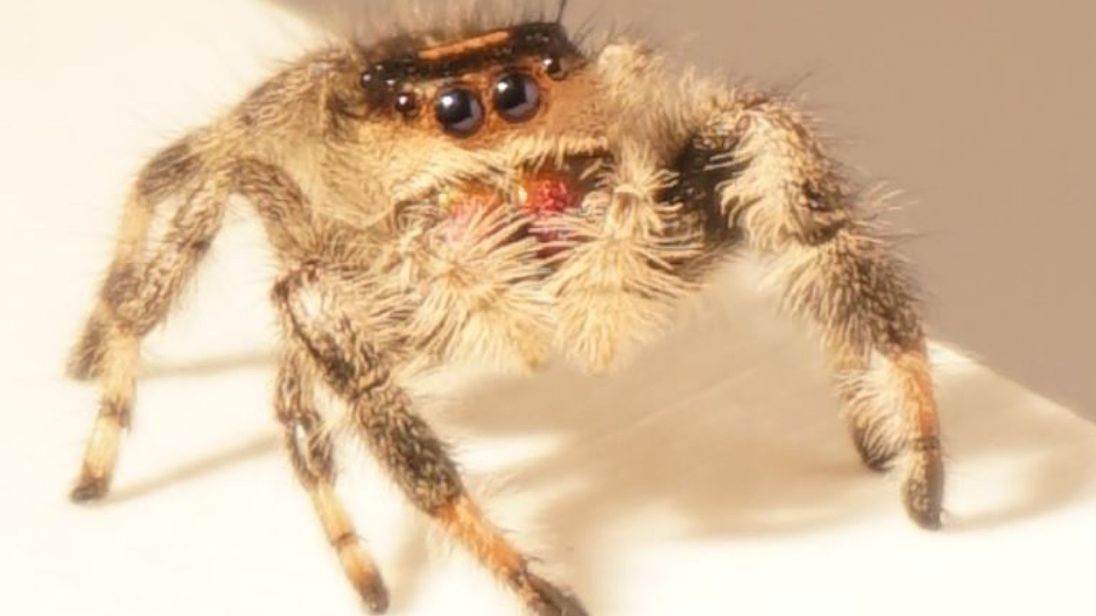
Most animals only perform tricks when bribed with treats. However, Kim, the world’s first spider to learn a skill, needs no incentives to do what she loves — jumping from different heights and distances — upon the bidding of a team of scientists from the University of Manchester.
While the idea of training a spider might sound sinister, the researchers’ motives were purely scientific. More specifically, the team, led by aeronautical engineer Dr. Mostafa Nabawy, was trying to unlock the secrets behind the jumping spiders’ extraordinarily high leaps to catch prey or to escape predators. Nabawy said, "Spiders have to plan everything, they have to execute accurate jumps and precise jumps to get their target [prey] as soon as possible and as accurately as possible." A better understanding of the biomechanics behind their leaps would help experts develop more efficient flying and jumping robots.

For their study, the researchers selected four female specimens of the regal jumping spider (Phidippus regius). Measuring an average of 15 mm, the eight-eyed arachnids — four large ones in the front and four smaller ones at the top of their heads — are among the largest members of the jumping spider family. While obtaining the test spiders from a pet shop was easy enough, training them to leap on demand so that the precise movements could be recorded was challenging.
Since spiders eat only once a week, tempting them with food would result in just a single leap every seven days. The researchers, therefore, decided to try to train the arachnids to jump by physically moving them back and forth between two moveable platforms, which could be adjusted to different levels and distances. They hoped that once the spiders became familiar with the challenge, they would try to attempt it themselves. After several tedious hours of training, one of the spiders, eventually nicknamed Kim, decided to cooperate and jump on demand.

Over the course of a week, Kim made 15 perfect leaps, demonstrating her prowess at hopping up from a higher platform to a lower one and vice versa. The scientists found that the spider could garner enough force in her legs to jump more than six times the length of her own body from a stationary position. In contrast, humans can, at best, jump a mere one and a half times the length of their body from a standing stance. What was even more amazing is that Kim always landed perfectly. “She never missed,” Nabawy says in awe. “She didn’t jump unless she was confident she could make the jump.” The researcher believes Kim can probably jump even higher but is restricted because her vision is not strong enough to see beyond six body lengths.
Camera footage and close-up 3D images revealed that Kim adjusted the position of her legs depending on the type of jump. For shorter distances, she expended a lot of energy, resulting in quick leaps, which the researchers believe probably increases her chances of catching fast-moving prey. The farther or more elevated the distance, the less extra energy was used, resulting in slower but precise leaps.

Previous studies have indicated that spiders use both their muscles and hydraulic pressure — a mechanism by which blood is transferred to their extended legs — to propel them off the ground. However, in Kim’s case, her leg muscles alone appeared to be generating enough force for the liftoff. The researchers, who published their findings in the online journal Nature Scientific on May 8, 2018, now intend to do further research to comprehend fully not just the spiders' jumping technique, but that of other insects as well. “We are familiar with robots that are aimed at taking over human functions, but there are millions of insects in the world that perform specific functions that we have interest in adapting to robotics,” says Nabawy. We wonder what leaping creature they will train next.
Resources: nationalgeographic.com, livscience.com, bbc.co.uk
